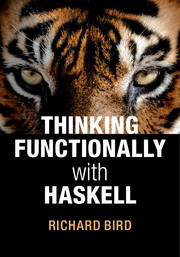6 - Proofs
Published online by Cambridge University Press: 05 November 2014
Summary
We have seen a lot of laws in the previous two chapters, though perhaps the word ‘law’ is a little inappropriate because it suggests something that is given to us from on high and which does not have to be proved. At least the word has the merit of being short. All of the laws we have encountered so far assert the equality of two functional expressions, possibly under subsidiary conditions; in other words, laws have been equations or identities between functions, and calculations have been point-free calculations (see Chapter 4, and the answer to Exercise K for more on the point-free style). Given suitable laws to work with, we can then use equational reasoning to prove other laws. Equational logic is a simple but powerful tool in functional programming because it can guide us to new and more efficient definitions of the functions and other values we have constructed. Efficiency is the subject of the following chapter. This one is about another aspect of equational reasoning, proof by induction. We will also show how to shorten proofs by introducing a number of higher-order functions that capture common patterns of computations. Instead of proving properties of similar functions over and over again, we can prove more general results about these higher-order functions, and appeal to them instead.
Information
- Type
- Chapter
- Information
- Thinking Functionally with Haskell , pp. 110 - 144Publisher: Cambridge University PressPrint publication year: 2014
